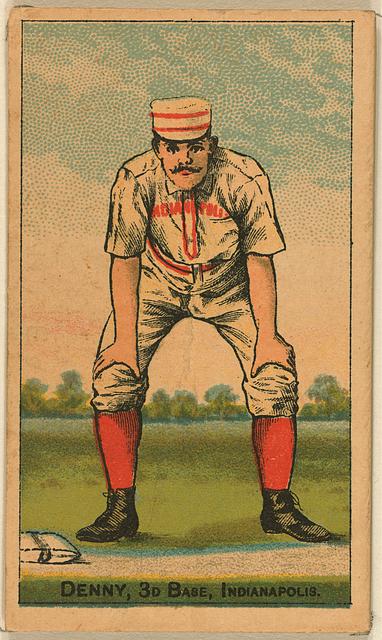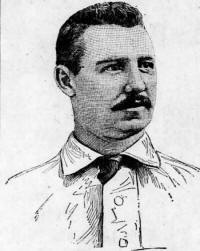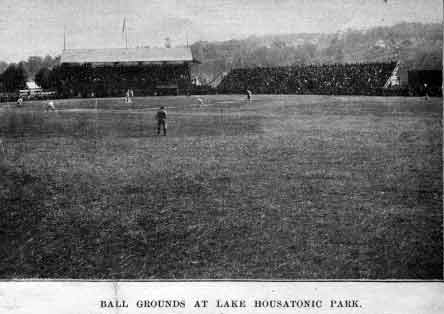 Jerry Denny
Jerry Denny
In 1935, sportswriters started the Baseball Hall of Fame with a ballot that had 33 names of players from 1900 to 1935 with up to 10 to be selected if they could receive 75% of the votes. Five did make it the first time around - Ty Cobb, Babe Ruth, Honus Wagner, Christy Mathewson and Walter Johnson There was also a list of approximately 32 "suggested" pre-1900 players to be selected by a separate "Old Timers" Committee and Denny was one of 2 third basemen on the list - the other was John McGraw. There was much confusion over the process and write-in votes were also allowed. No player on the list or by write-in received the required 75% needed for entry though Denny did get more votes than several others who eventually were elected to the Hall of Fame.
But before we get into more details of his entire baseball career, it's the Derby connection that brings him to the Derby Hall of Fame. Derby was a hotbed of baseball in the pre-1900's and had it's own beautiful stadium in Lake Housatonic Park along what is today's Roosevelt Drive next to the Housatonic River. Some considered Derby's ball field to be the best in the state with a seating capacity of 3,000. The Derby Street Railway Company had a branch line built to the park to make it easier for people to get there. By 1896 Derby had a minor league team playing in the Naugatuck Valley League. But in 1897 the new and higher level Connecticut State League was begun in Derby with six teams around the state. Baseball Reference rates the league's classification as F, and the players were paid and considered professionals. Sturgis Whitlock of Huntington was the president of the league which was organized in Derby and he held that role for many years - even after Derby was no longer in the league. Denny had moved to Connecticut and become a business man working in men's clothing and then the hotel business. He was hired to play for and coach the Derby Angels and helped to establish the professional credentials of the Angels based on his major league record. He lived on Elizabeth Street with his family. He had run the Ashwood House in Ansonia, but took over John Holian's hotel in February 1898. Ironically Holian's hotel was once the home of another member of this year's Hall of Fame class, Dr. Ambrose Beardsley!. The Connecticut State Base Ball League had teams in Derby, Danbury, Torrington, Bridgeport, Bristol and Meriden. The Derby team was called Angels and sometimes referred to as the "White Wings." That first season was very successful as Derby finished a strong second to Meriden in the standings. However, the Angels finished on an even higher note when they won the league's Nutmeg Cup after easily defeating the regular season champion Meriden Bulldogs in a post season series. The Sporting Life newspaper which covered baseball nationally said, "The Meridens may be called champions of the League, but the Derby Angels are champions of the champions. They have continually outbatted, outfielded and outgeneraled the rag (rag was a term for league champion) winner until it has been proven that the Meridens have simply been out classed." Derby and Denny competed in the league until 1901 when they were unceremoniously dropped from the league and their players transferred to Harford for the 1902 season. Derby had their struggles financially, and even disbanded in the middle of the 1898 season with Denny finishing the season with Bridgeport. He was one of the owners in 1900 and 1901, until the team was sold in August, 1901 and Denny relinquished his role and finished the season with Norwich under the protest of the new Derby owners who felt that Denny was still under contract to Derby. Getting back to his major league days, Denny, whose real name was Jeremiah Dennis Eldridge, was born in New York, but raised in orphanages in California after his Irish immigrant parents died following the move. He made a name for himself while playing college ball, and according to writer Chris Rainey he used the name Jerry Denny instead of his full name to preserve his amateur status since he was still in college while beginning to play for professional teams in California. His major league career began in 1881 with the Providence Grays of the National League. He made his mark more as a fielder than a hitter; but in a dead ball era, he did lead the Grays in home runs with 6 in 1884 when the Grays won the pennant. They then challenged the New York Metropolitans of the rival American Association to a post season series which is considered the first unofficial world series. Providence won three straight games at the old Polo Grounds in New York and Denny etched his name in the record books by hitting the first and only home run in the series. His major league career spanned the years 1881-1894 and included stops in St Louis (Maroons), Indiana, New York (Giants), Cleveland, Philadelphia and Louisville. The years around 1890 were filled with controversy in baseball as players became affiliated with The Brotherhood of Professional Baseball Players (forerunner of a union) and its Players League which was in direct competition with the National and many established players bolted to the new league. Though other players expected Denny to jump to the Brotherhood and the Pittsburgh team of the Players League, he opted to stay with Indianapolis in 1890 which stained his relationship with many of the Brotherhood players. He explained that, "Baseball playing is my business, and I expect to make money out of it; and for that reason I don't want to jump into an airy project at the sacrifice of what I now have." You can find all of his baseball statistics here. Incidentally, he still is tied for the record for most assists in a game for a third baseman which is 11. Francis Richter who founded the Sporting Life newspaper mentioned above wrote the "History and Records of Baseball: the American Nation's Chief Sports" in 1914. In it he selected the greatest players at each position by decade up to that time, and his two choices for third base for 1880-1890 were Denny Lyons and Jerry Denny! In an interview in the Washington Post in 1908, he described what it was like to play without a glove. He said, "Many a time my hands were ripped, or the flesh of the finger torn away from the nail trying to stop a whopper, but the only consolation I got was to, 'Go tie a rag around your finger and play ball.' And I had to do it, too. And don't make any mistake about the way the big fellows used to hit in those days........They could lay the wood to the ball for keeps, and when it came at you the ball left a smoky streak." He continued. "No, the ball didn't hurt. My hands became hardened to the knocks and I grabbed them barehanded as easily as your Devlin does with his heavy glove. Once in a while a ball took a bad bound, and there was blood and a lot of pain. But they wouldn't let you lay off until you broke an arm or leg." He did recall, "I remember playing a game in Derby when I was running a team up there, and one day I got out in the field with one of those finger gloves that they use now. And do you believe it, I didn't know how to catch the ball!" When he passed away in Texas while visiting his daughter in 1927, several newspapers across the country carried this headline to his death notice - "Jerry Denny, Babe Ruth of '80's is Dead". While that certainly was a bit of an exaggeration, Jerry Denny did make his mark in Derby and every where else he went and is a fitting member of the Derby Hall of Fame.
|



